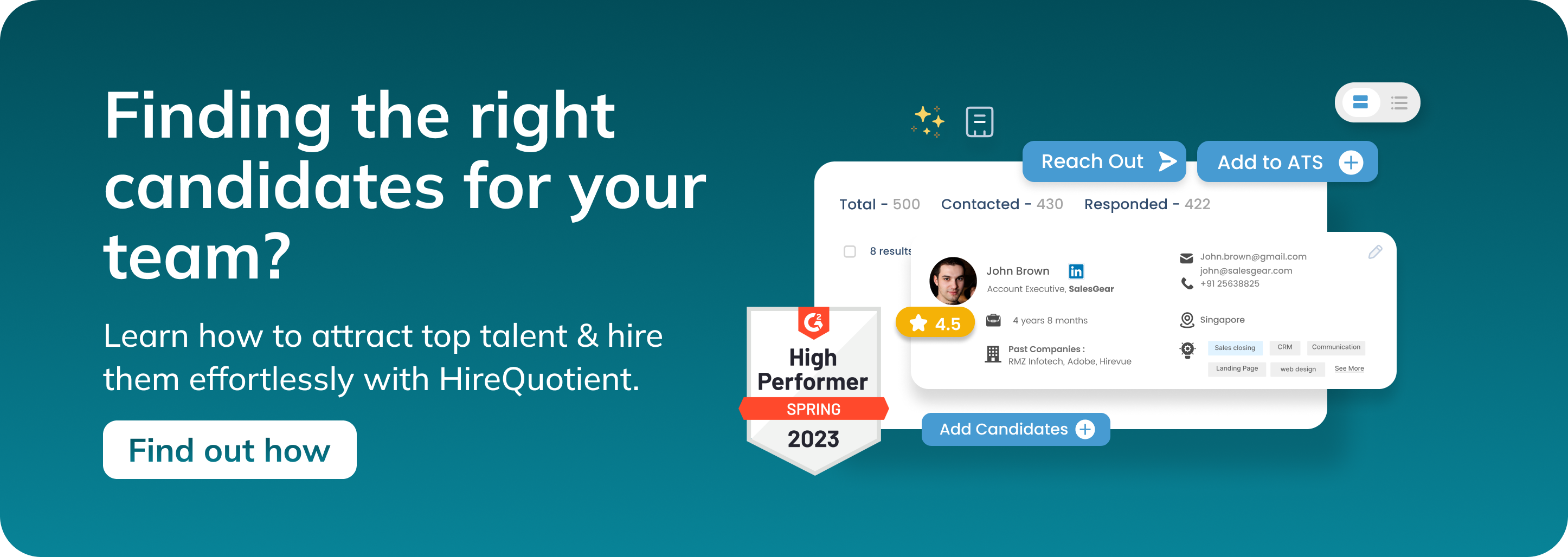Employee Value Proposition (EVP)
Employee Value Proposition (EVP) is the balance of the rewards and benefits that are received by employees in return for their performance at the workplace.
Today it's more important than ever for businesses to have a strong employee value proposition (EVP). An EVP is a set of benefits and opportunities that a company offers its employees, both tangible and intangible. It defines what makes your company a desirable place to work, and it can help you attract and retain top talent.
A well-crafted EVP should be unique to your company and aligned with your core values. It should also be something that your employees can see and feel daily. When done right, an EVP can be a powerful tool for building a strong and engaged workforce.
Before delving into the intricacies let us first define employee value proposition.
What is the Employee Value Proposition? EVP Meaning
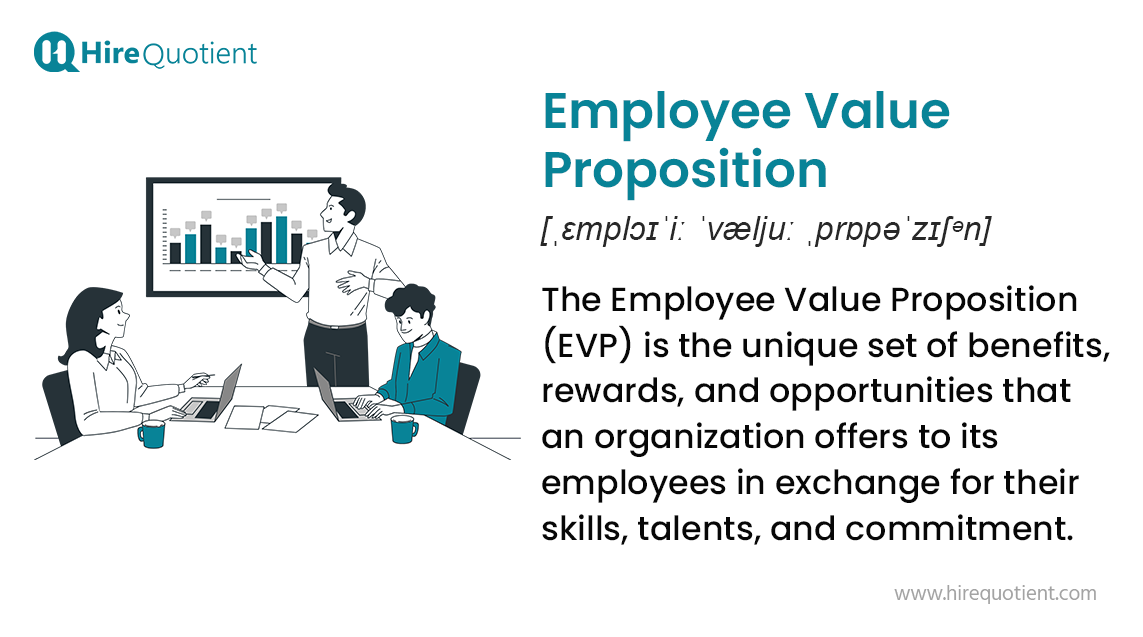
An employee value proposition (EVP) is a set of tangible and intangible benefits that an organization offers to its employees in exchange for their skills, experience, and commitment. It is essentially a promise that the organization makes to its employees, and it should be communicated clearly and consistently to both current and prospective employees.
The EVP should be unique to the organization and should be based on its strengths and values. It should also be relevant to the target audience, which is the group of employees that the organization is trying to attract and retain.
The EVP should be communicated through a variety of channels, including the organization's website, job postings, and employee onboarding materials. It should also be reflected in the organization's policies and practices, such as its compensation and benefits programs, its work-life balance policies, and its opportunities for professional development.
A strong EVP can help an organization attract and retain top talent, improve employee engagement, and boost productivity. It can also help to create a positive and productive work environment.
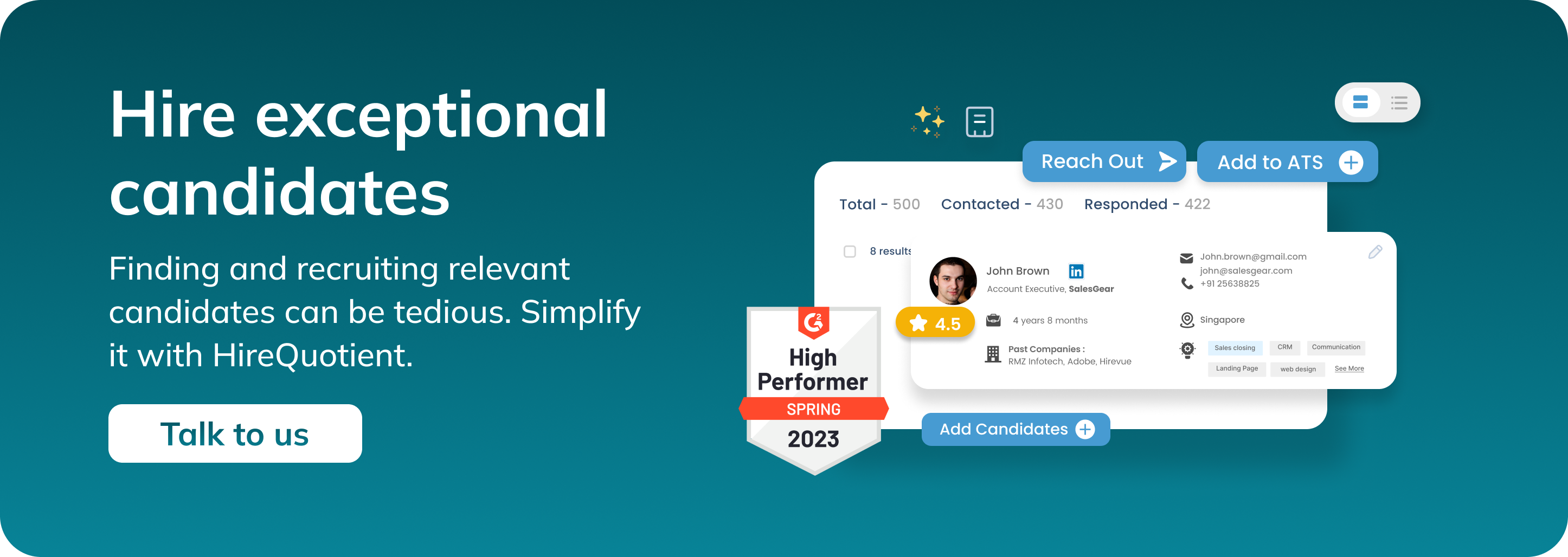
Employee Value Proposition Components
The Employee Value Proposition (EVP) refers to the unique set of benefits and rewards that an organization offers to its employees in exchange for their skills, experience, and contributions. It encompasses what employees can expect from their employment experience beyond just a salary.
The EVP is crucial for attracting, retaining, and engaging talented individuals within the organization. The components of an EVP can vary depending on the company and its culture, but generally, it includes the following elements:
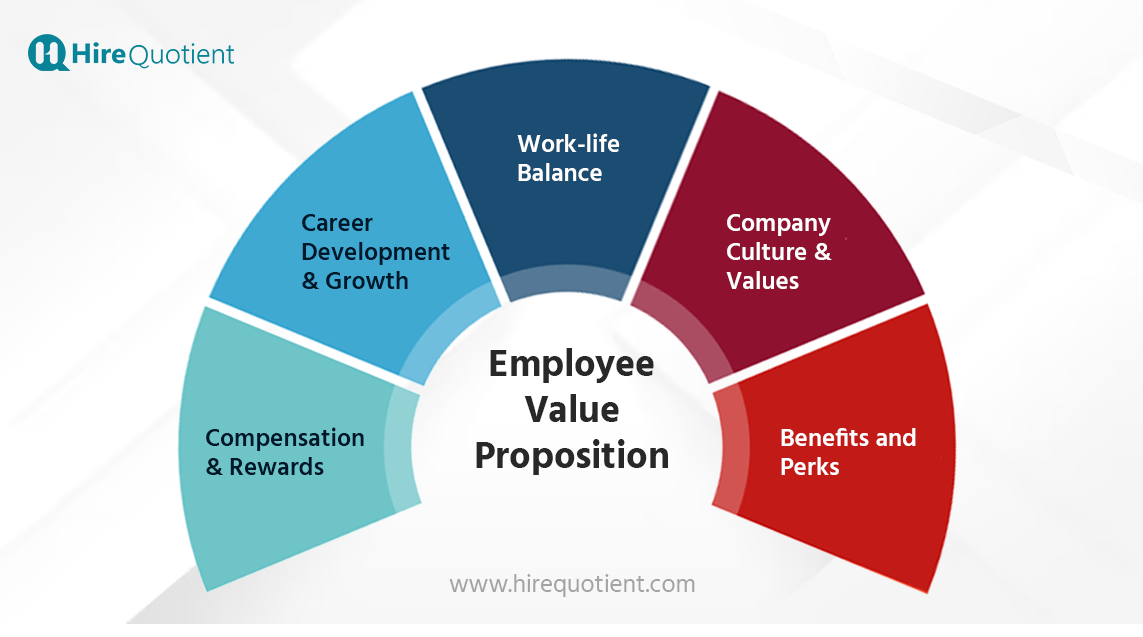
- Compensation and Rewards: This component includes not only the base salary but also bonuses, incentives, and any other financial rewards employees receive for their performance. This element ensures that employees feel adequately compensated for their work and contributions.
- Career Development and Growth: Employees seek opportunities for professional development and growth. A strong EVP should outline how the organization supports employees' career advancement through training, mentorship, skill-building programs, and pathways to promotion.
- Work-Life Balance: Maintaining a healthy work-life balance is essential for employee well-being. An EVP should highlight the organization's policies and practices that support flexible work arrangements, time-off benefits, and initiatives that promote a healthy balance between work and personal life.
- Company Culture and Values: Employees are drawn to organizations that align with their values and provide a positive work environment. An EVP should convey the company's culture, values, and its commitment to fostering an inclusive, diverse, and respectful workplace.
- Benefits and Perks: Beyond monetary compensation, organizations offer various benefits and perks that enhance the overall employee experience. This can include health insurance, retirement plans, wellness programs, employee discounts, on-site facilities, and other non-financial perks that contribute to employees' quality of life.
Importance of Employee Value Proposition
The Employee Value Proposition (EVP) plays a crucial role in attracting, retaining, and engaging top talent within an organization. Here are some key reasons why the EVP is important:
- Talent Attraction: A strong EVP helps differentiate your organization from others and attracts high-quality candidates. It gives potential employees a clear understanding of what makes your company unique and why they should choose to work for you.
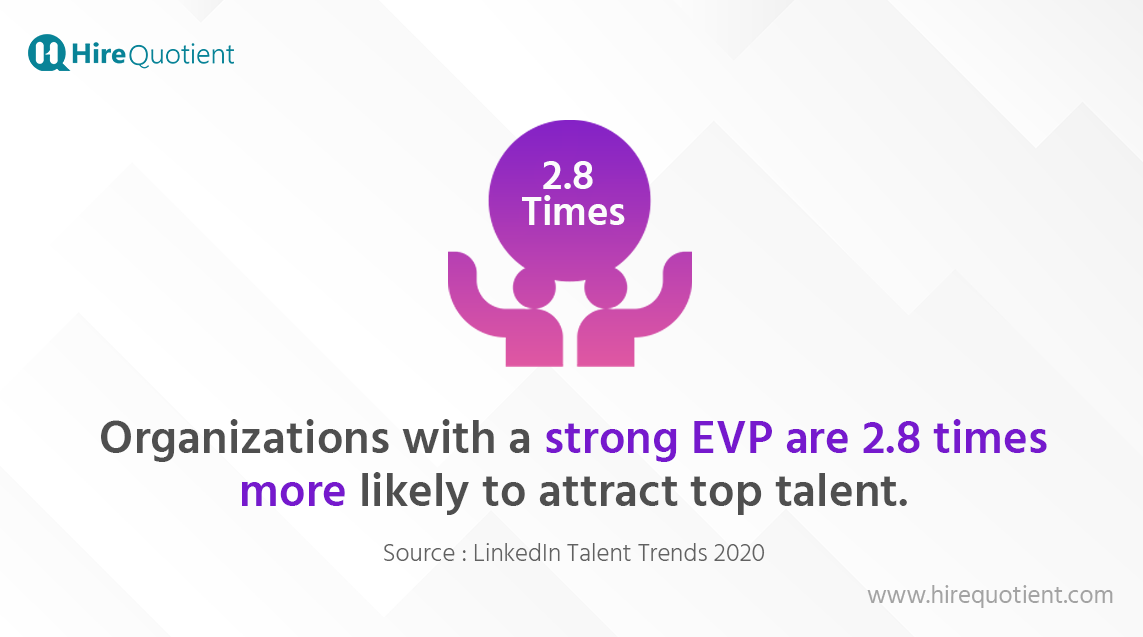
- Employee Retention: A well-defined EVP helps build employee loyalty and commitment. When employees feel that their needs and expectations are met, they are more likely to stay with the organization and contribute to its success over the long term.
- Engagement and Productivity: An effective EVP contributes to higher levels of employee engagement. When employees feel valued and supported by their organization, they are more motivated, productive, and willing to go the extra mile to achieve company goals.
- Positive Company Reputation: A strong EVP can enhance your organization's reputation as an employer of choice. Positive word-of-mouth from satisfied employees can lead to a larger pool of qualified candidates applying for positions and improve the overall perception of your company in the marketplace.
- Cost Savings: High turnover rates can be costly due to recruitment, onboarding, and training expenses. A compelling EVP can reduce turnover by creating a more satisfying work environment, thus saving the organization money in the long run.
- Diversity and Inclusion: A well-crafted EVP that emphasizes diversity and inclusion can attract a more diverse talent pool. A diverse workforce brings different perspectives and ideas, leading to innovation and better decision-making.

Employee Value Proposition Benefits
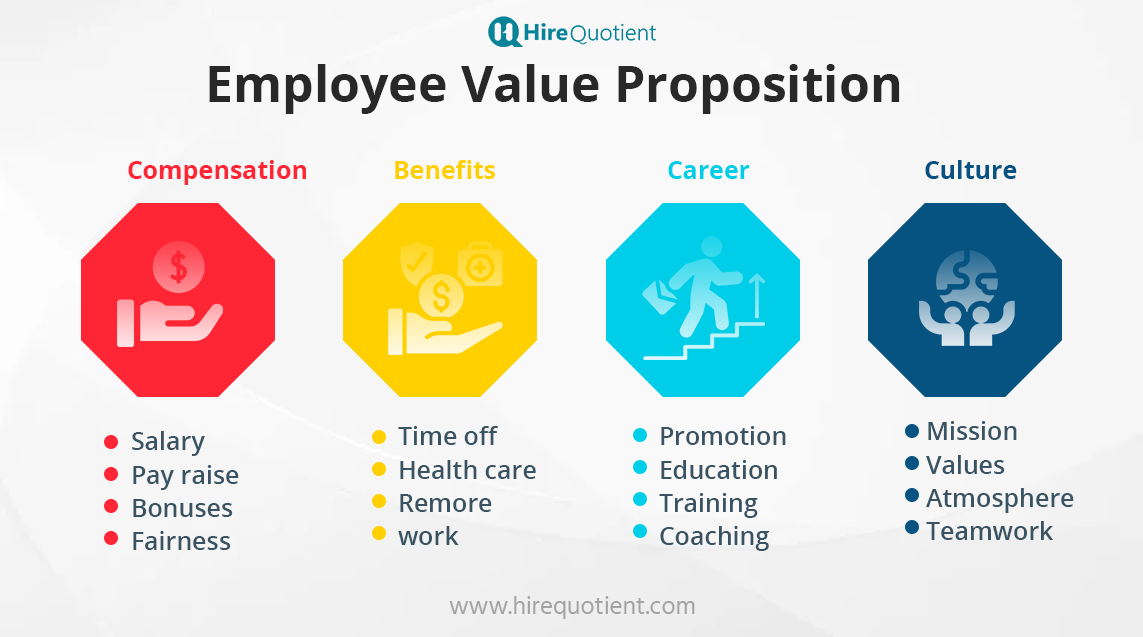
An Employee Value Proposition (EVP) is a set of unique offerings and advantages that an employer provides to its employees in exchange for their skills, talents, and contributions. Crafting a compelling EVP can help organizations attract, retain, and engage top talent. Here are some benefits that an EVP can offer to employers:
- Talent Attraction and Retention: A well-defined EVP can serve as a powerful magnet for attracting high-caliber talent. When potential candidates perceive the unique benefits and positive work environment offered by the organization, they are more likely to choose that company over others. Additionally, a strong EVP helps in retaining existing employees, reducing turnover and associated costs.
- Enhanced Employee Engagement: An EVP that aligns with employees' values, aspirations, and expectations fosters a deeper sense of engagement. Employees who resonate with the company's mission, culture, and opportunities are more likely to be motivated, committed, and invested in their work, leading to increased productivity and overall job satisfaction.
- Improved Employer Branding: A compelling EVP can differentiate the organization in a competitive job market. Positive word-of-mouth from satisfied employees can enhance the employer's reputation and branding, making it a preferred choice for potential candidates. A strong employer brand not only attracts top talent but also positively impacts the organization's overall brand image.
- Higher Productivity and Innovation: When employees feel valued and supported by the organization, they are more likely to be innovative and contribute their best ideas. An EVP that includes opportunities for skill development, recognition, and growth fosters a culture of continuous learning and creativity, ultimately leading to higher levels of productivity and innovation.
- Cost Savings and Efficiency: A well-crafted EVP can lead to cost savings in various ways. Reduced turnover and associated recruitment costs, as well as increased employee loyalty and advocacy, can contribute to long-term financial benefits. Moreover, engaged and motivated employees tend to be more efficient and effective in their roles, leading to improved operational performance.
What Makes a Good EVP?
A good EVP is one that is:
- Unique: It should highlight what makes your company different from its competitors.
- Valuable: It should offer benefits that are important to employees.
- Credible: It should be backed up by real evidence, such as employee satisfaction surveys or turnover rates.
- Differentiated: It should clearly distinguish your company from its competitors.
- Flexible: It should be able to change over time as your company evolves.
- Communicated: It should be communicated to employees in a clear and concise way.
How to Measure Employee Value Proposition?
Measuring the Employee Value Proposition (EVP) involves assessing various factors that contribute to the overall satisfaction and engagement of employees within an organization. Here's a step-by-step guide on how to measure EVP:
- Define Your EVP Components: Identify the key elements of your organization's EVP. These could include compensation, benefits, career development opportunities, work-life balance, company culture, leadership, and more.
- Employee Surveys: Conduct regular employee surveys to gather feedback on different aspects of the EVP. Use structured questions to measure employee satisfaction, engagement, and perception of various EVP components.
- Quantitative Metrics:
- Retention Rate: Calculate the percentage of employees who remain with the company over a specific period. High retention rates suggest a strong EVP.
- Turnover Rate: Measure the percentage of employees who leave the organization. High turnover might indicate EVP shortcomings.
- Time to Fill Open Positions: Evaluate how quickly vacant positions are filled. A shorter time might indicate a positive EVP, as it suggests a desirable workplace.
- Employee Referral Rate: Determine the proportion of new hires who come through employee referrals. A high rate could indicate a positive EVP, as employees are likely to refer their contacts to a good workplace.
- Qualitative Insights:
- Focus Groups: Conduct focus group discussions to gather in-depth insights into how employees perceive different aspects of the EVP.
- One-on-One Interviews: Interview a sample of employees to understand their experiences, motivations, and pain points related to the EVP.
- Exit Interviews: Gather feedback from departing employees to understand why they are leaving and if any EVP factors played a role.
- Benchmarking: Compare your organization's EVP against industry standards and competitors to understand how competitive your offerings are and where improvements can be made.
- Analyzing Employee Reviews: Monitor online platforms where employees leave reviews about their workplace experience, such as Glassdoor. Pay attention to common themes and sentiments.
- Performance Metrics:
- Performance Ratings: Analyze employee performance ratings to see if there's a correlation between EVP satisfaction and performance.
- Productivity and Innovation: Assess whether employees who are more satisfied with the EVP are more productive or contribute more to innovation.
- Impact on Business Goals:
- Business Metrics: Examine how the organization's key performance indicators (KPIs) are influenced by employee satisfaction. For example, customer satisfaction, revenue growth, and market share.
- Costs and Benefits Analysis:
- Cost of Turnover: Calculate the cost of recruiting, training, and onboarding new employees due to turnover. Compare this to investments in EVP improvements.
- Return on Investment (ROI): Assess the ROI of various EVP initiatives. For example, calculate how much-increased employee engagement leads to improved productivity.
- Continuous Improvement: Use the gathered data and insights to continuously refine and enhance your EVP based on the areas that need improvement.

How to Improve Your Employee Value Proposition?
If you are looking to improve your organization's EVP, here are some tips:
- Start by assessing your current EVP. What are your core values? What is your mission and vision? What is your culture like? What are your compensation and benefits? What are your career development opportunities? What is your work-life balance like? How do you recognize and celebrate your employees?
- Once you have assessed your current EVP, identify areas where it can be improved. What are the most important things to your employees? What are your competitors offering? What are the trends in the labor market?
- Develop a plan to improve your EVP. This plan should be specific, measurable, achievable, relevant, and time-bound.
- Communicate your EVP to your employees. Make sure they know what you value and what you offer them.
- Measure the effectiveness of your EVP. This will help you track your progress and make sure that your EVP is still relevant and effective.
Employee Value Proposition Model
There are many different employee value proposition (EVP) models available. Some of the most common models include:
- The total rewards model focuses on the tangible and intangible benefits that employees receive from their employer. This includes compensation, benefits, career development opportunities, and work-life balance.
- The purpose-driven model focuses on the organization's mission and vision and how employees can contribute to making a difference in the world. This model is often appealing to employees who are looking for a sense of purpose in their work.
- The culture-driven model focuses on the organization's culture and how it creates a positive and supportive environment for employees. This model is often appealing to employees who are looking for a company that shares their values.
- The growth-driven model focuses on the opportunities for employees to develop their skills and advance their careers. This model is often appealing to employees who are ambitious and want to grow their careers.
- The work-life balance model focuses on the organization's commitment to providing employees with a healthy work-life balance. This model is often appealing to employees who want to have a good balance between their work and personal lives.
The best EVP model for an organization will depend on its specific goals and objectives. For example, an organization that is focused on attracting and retaining top talent may want to emphasize the total rewards model. An organization that is focused on creating a positive and supportive work environment may want to emphasize the culture-driven model.
No matter which model an organization chooses, it is important to make sure that the EVP is aligned with the organization's values and mission. The EVP should also be communicated to employees in a clear and concise way.
EVP vs Employer Brand
Employee Value Proposition (EVP) and Employer Brand are two closely related concepts that are often used interchangeably. However, there is a subtle difference between the two.
EVP is a set of tangible and intangible benefits that an organization offers to its employees. It is what the organization promises to deliver to its employees in exchange for their skills, experience, and commitment.
Employer brand is the perception of an organization as an employer. It is what employees, potential employees, and other stakeholders think about the organization as a place to work.
In other words, EVP is what an organization offers to its employees, while employer brand is how those offerings are perceived by others.
The EVP is the foundation of the employer brand. It is what gives the employer brand its substance and credibility. The employer brand is the outward expression of the EVP. It is how the EVP is communicated to others.
A strong EVP will lead to a strong employer brand. When employees feel valued and appreciated, they are more likely to speak positively about their employer to others. This can help to attract new talent and boost the organization's reputation as an employer of choice.
Here is a table that summarizes the key differences between EVP and employer brands:
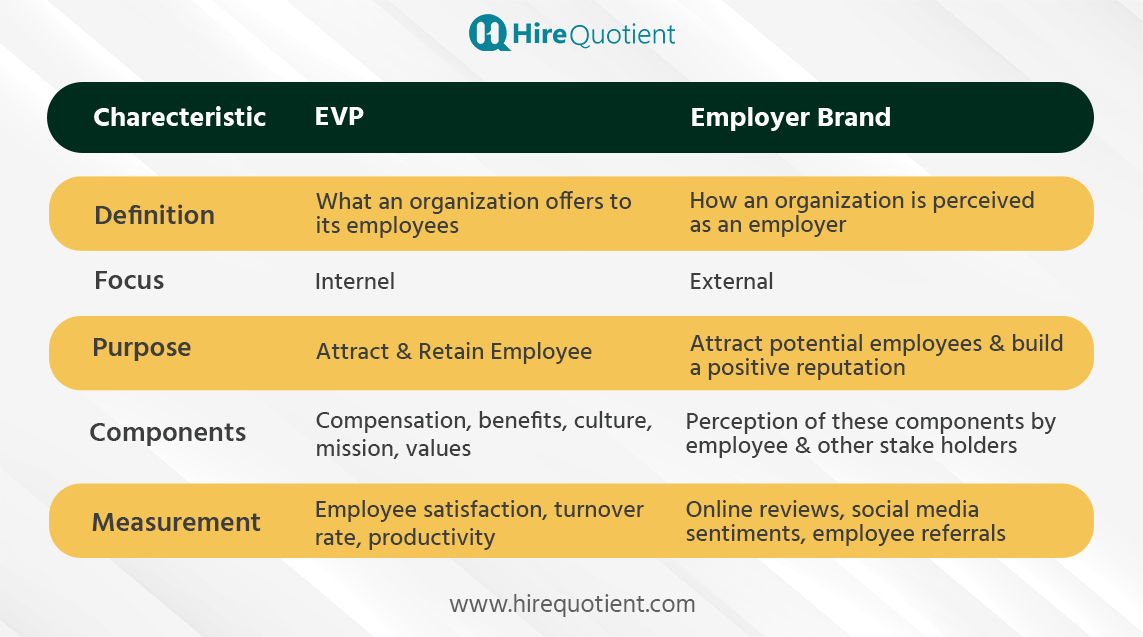
Employee Value Proposition Framework
Creating an effective Employee Value Proposition (EVP) framework involves structuring the key elements that make up your organization's unique offering to employees. This framework helps guide your EVP strategy, communication, and implementation. Here's a suggested framework for developing your EVP:
The EVP framework typically includes the following elements:
- Compensation and benefits: This includes salary, bonuses, health insurance, retirement plans, and other financial benefits.
- Work-life balance: This includes flexible work arrangements, paid time off, and other policies that support employees' personal lives.
- Culture and values: This includes the organization's mission, vision, and values, as well as the overall work environment.
- Career development: This includes opportunities for training, development, and advancement.
- Sense of purpose: This includes the opportunity to make a difference in the world or to work on a mission-driven project.
- Other factors: This could include things like location, opportunities for travel, or the company's reputation.
Employee Value Proposition Examples
- Google: "Do the work that matters." Google's EVP focuses on the impact that its employees can have on the world. The company offers a variety of opportunities for employees to make a difference, such as working on projects that address climate change or social justice.
- Salesforce: "The world's most innovative workplace." Salesforce's EVP emphasizes the company's commitment to innovation. The company offers a variety of resources for employees to learn and grow, and it encourages employees to take risks and try new things.
- Netflix: "Freedom and responsibility." Netflix's EVP gives employees a lot of freedom and responsibility. The company has a flat organizational structure, and employees are encouraged to be self-directed and take initiative.
- Patagonia: "Build the best product, cause no unnecessary harm, use business to inspire and implement solutions to the environmental crisis." Patagonia's EVP is focused on sustainability. The company is committed to making the best products possible while minimizing its environmental impact.
- Southwest Airlines: "The freedom to be yourself." Southwest Airlines EVP emphasizes the company's relaxed and friendly culture. The company encourages employees to be themselves and to have fun at work.
In conclusion, an employee value proposition (EVP) is a statement of the value an organization offers to its employees in return for their skills, experience, and commitment. It is a unique selling proposition for the organization as an employer, and it should be tailored to the specific needs and desires of the target audience.
A well-crafted EVP can be a powerful tool for attracting and retaining top talent. By taking the time to develop an effective EVP, organizations can create a competitive advantage in the war for talent.
Here are some key takeaways from this blog post:
- The EVP framework typically includes the following elements: compensation and benefits, work-life balance, culture and values, career development, and sense of purpose.
- The specific elements of the EVP will vary from organization to organization, but the goal is to create a compelling message that will attract and retain top talent.
- When developing an EVP, it is important to consider the following factors: the target audience, the company's culture and values, the company's competitive advantage, and the company's goals.
- A well-crafted EVP is not set in stone. It can be updated as the company grows and changes.
